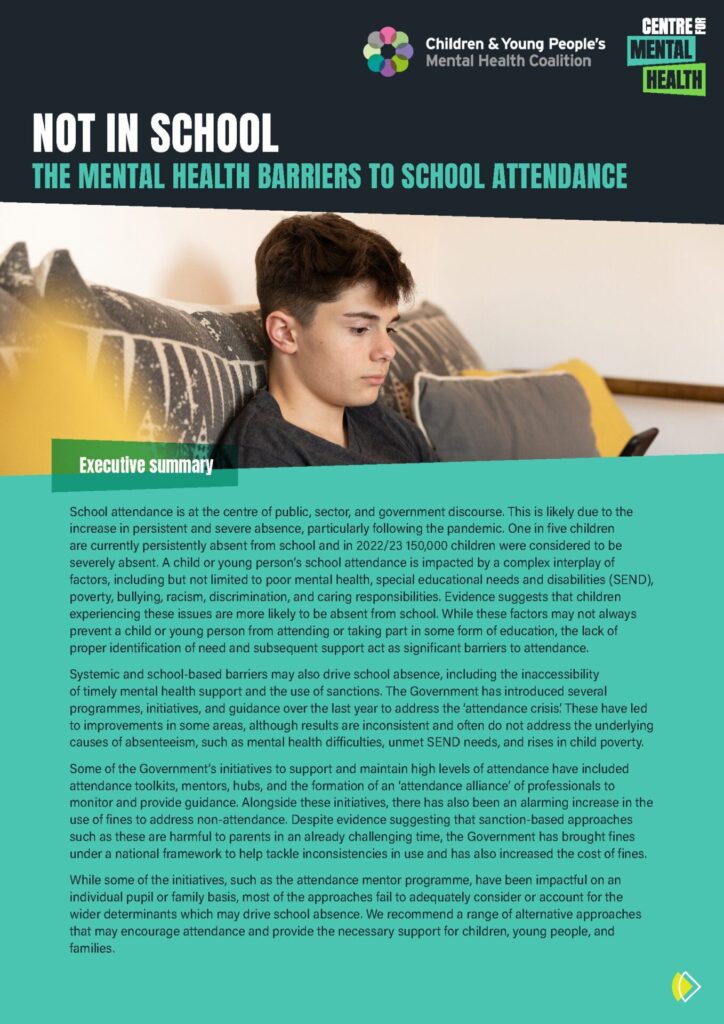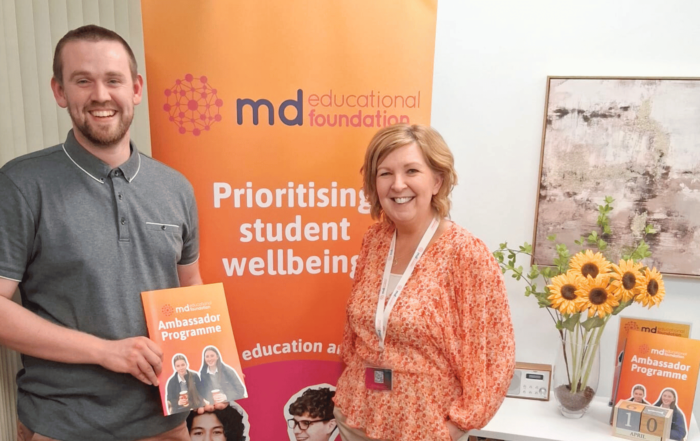Student attendance is a big concern topic across the UK and Ireland right now. BBC News reported that more than one in five children in England are persistently absent from the classroom.
According to data shared by GOV.UK, in the past two years in England, the percentage of persistent absentees (where 10% or more sessions have been missed) for Year 12 and above is over 32%. Even though attendance is not compulsory in sixth form, it is a legal requirement in the UK for young people to stay in some form of education until they are 18 (in post-16 settings, which might mean sixth form, apprenticeships, or college). In sixth-form settings, it’s still very much expected that 16-18-year-olds attend as much as possible and students also can be removed from school for very bad attendance.
In this blog, we explore school refusal, absences, and their impact on young people. We also hear from professionals on how to reduce the number of absences and further prevent them from happening. Read on for impactful tips and practical ideas on improving student attendance in schools.
Reasons behind student absences and the impact they can have on young people
There are many reasons why young people can’t or don’t want to attend school. These can include anxiety, depression and other mental health struggles, bullying, lack of additional support, health concerns, family circumstances, social or personal challenges, disengagement with school, long and expensive commutes, other accessibility barriers, working as a young carer, work to support and provide for their family…
…and as per The Guardian and Schools Week report, the list goes on.
Many different factors and combinations can be behind each absence, which makes it hard to take the first step towards reducing absenteeism – especially when resources are limited. It’s vital to approach every situation with the individual’s best interests in mind and start by finding the underlying issue that’s stopping the student from attending school. Centre for Mental Health and the Children and Young People’s Mental Health Coalition shared the ‘Not In School – The Mental Health Barriers To School Attendance‘ report (2024), where they explored the mental health barrier to school attendance:
“In order to adequately address attendance issues, the social determinants and wider barriers must be considered and addressed. Tackling disparities and risk factors for poor mental health in the early years and childhood are some of the most effective preventative measures that can be taken, yet there has been a significant lack of action by the Government in this area.”
There are many reasons why young people can be absent from school, and likewise, many ways academic absence can affect them. Absenteeism can cause young people to feel socially isolated, it can negatively impact their confidence and self-worth and increase the risk of a decline in academic achievements.
For post-16 students, missing lessons can be costly as they lose out on important information and learning opportunities while they work towards exams. As well as this, it can negatively impact their wellbeing and outlook for the future.
Ways you can encourage young people to attend classes
School refusal doesn’t have one correct solution because every young person has individual needs and should be treated as such. There are approaches that can be taken at school and at home to support young people to return to school and attend classes.
We talked to one of mdeducational foundation’s Wellbeing Leads, Andrew Bould, placed in a school in England. One of Andrew’s areas of expertise is more person-centred approach to the issue of absence as well as on school refusal. In his words:
“We need to use a holistic and person-centred approach to supporting students. There should ideally be a large community working together with them towards reintegration. We also need to address school refusal on both a proactive and reactive level so that we not only support those students who are currently affected but also with the aim of preventing further school refusals.
The real benefit of having a dedicated wellbeing professional, such as a Wellbeing Lead, is that they can be responsible for coordinating the approach and ensuring everyone involved is singing from the same hymn sheet. This is usually the toughest part of supporting a school refuser.”
Andrew also shared some practical tips and ideas to help support young people to attend classes and prevent student absences:
“Start by talking with the student and really understanding their push and pull factors for school. It can really vary, and it isn’t a one-size-fits-all approach, so be aware that some of these tips won’t always be appropriate to use.
In school:
- Establish a culture of psychological safety
This can be done as a teaching approach by championing those students who take risks and try to engage by answering questions, giving presentations, and public speaking – especially showing appreciation for those who make mistakes or don’t do very well. It needs to be ingrained in the culture of the schools that students support each other when they make mistakes rather than ridicule one another.
- Go at the pace of the student and be prepared for setbacks
The road back into attending school doesn’t have to be linear, and what works one day doesn’t guarantee that it will again. Push and pull factors will change over time, and so should your efforts.
- Communicate the school’s needs and expectations with the student
It’s essential for the student to gain an understanding of their role within the school and how they affect others. Understanding their accountability to others is a huge part of them developing the self-awareness required for reintegration. It’s important that this is done in a compassionate way and not one that puts further pressure on them.
- Ensure the student has access to consistent safe contact throughout the day
This could be headed up by one person, such as a Wellbeing Lead, but the aim should be to have a large support team that includes teachers, support staff, and friends of the student.
At home:
- Staying at home should become less appealing than attending school
This doesn’t mean making the home environment hostile, but rather, less rewarding. It’s crucial to establish firm boundaries regarding what the student can do during school hours, such as not having access to things they wouldn’t have when at school, like video games or other media.
- Access to the internet and social media needs to be monitored
It’s integral to make sure the student isn’t accessing content that’s detrimental to their worldview and mindset.
- Keeping up with schoolwork should be encouraged
When at home, students should aim to keep up with schoolwork as much as possible so that being behind on work doesn’t become a further compacting issue.
- Enlist friends to help
Friends of the student can really support them to get them out of their house and back into school. Arrange for a friend to commute to school with them or meet up with them outside of school hours to complete homework together and talk about any positive experiences at school that they are missing out on. This is a great way to help reinforce the message that positive things can happen at school.”
How can mdeducational foundation help to improve student attendance?
Many student absences are related to mental health and wellbeing challenges, so a generic push doesn’t usually work – and might even make things worse. By addressing attendance challenges through a wellbeing-focused lens, schools can create a supportive environment that promotes positive mental health and empowers students to thrive academically and personally. Especially within the post-16 settings, it is essential for young people to feel empowered and resilient as they work towards their future.
mdeducational foundation is a charity normalising student psychological fitness and resilience through guidance and early intervention by providing a three-year salary-funded commitment to placing dedicated wellbeing professionals within post-16 educational settings.
Leah Iles, CEO of mdeducational foundation, advises:
“The urgency for additional support can be seen in the recent documentary from Roman Kemp, ‘The Fight For Young Lives’. It highlights that young people aged 16 to 18 are struggling to get the essential wellbeing and mental health support they need, as a result of the endless waiting times at CAMHS and NHS. Eventually, they turn 18 and are then thrown to the back of the ‘adult’ line to start the waiting process all over again.
With a clear lack of research and support for post-16 students, we see further education as a crucial area for improvement when it comes to supporting adolescents dealing with wellbeing challenges. We can’t currently see a light at the end of the tunnel for the educational sector to have enough funds to prioritise student wellbeing. So now more than ever, intervention is needed – this is why we’re stepping up until somebody else can.”
mdeducational foundation is proud to be members of the Children & Young People’s Mental Health Coalition, a group of charities working together to drive for wellbeing of children and young people. As CYPMHC and CenterforMH mentioned in their report:
“While mental health is not the primary responsibility of education settings, they are well placed to help children and young people by providing a welcoming and inclusive space, and the opportunity to speak with trusted adults outside of family or care settings. […] Ensuring that schools are a positive place to be, by taking a flexible approach to children’s needs (including around attendance), is likely to have the biggest overall impact on attendance.”
We know that mdeducational foundation can’t solve everything, but we can take steps towards shaping the future by pushing for change. By funding the placement of Wellbeing Leads into post-16 settings, we are putting student wellbeing at the forefront of education – providing much-needed support for their wellbeing needs through education and beyond. Our Wellbeing Leads can offer these students a helping hand and work together on a plan for returning to school. Providing a safe space, a Wellbeing Hub, and a listening ear can be vital for young people who are struggling to attend school. By providing fully funded wellbeing support, we are enabling educational settings to kickstart their long-term wellbeing strategies to improve not only attendance but also help students thrive in school settings.
How do our Wellbeing Leads reduce and prevent student absences, and what have they achieved?
The role of a mdeducational foundation Wellbeing Lead is to promote positive wellbeing through the delivery of a wellbeing curriculum, by normalising student psychological fitness and resilience. They create safe spaces for post-16 students within schools and educational settings across the UK and Ireland.
Andrew Bould shared insights about the role of a Wellbeing Lead and specifically what they do to reduce and prevent the number of student absences in schools:
“As a Wellbeing Lead, part of my role is to support students struggling to attend school. This starts by building a connection with them and understanding their individual perspective and experience.
After this, I build a plan alongside the student for reintegration with the school. This involves integrating the needs and aims of the student, their parents, and the school, and making sure the plan is clearly communicated to all parties. I also offer support and training to both the home and the school. My role also includes communicating with any external agencies such as CAMHS.
One of the biggest benefits of having a full-time Wellbeing Lead is that they can identify cultural and systemic challenges to wellbeing – including reasons for school refusal. They can then offer solutions, and work towards transforming systems and culture to be more aware of their impact on student’s attendance and wellbeing, and proactive about changing it.”
To shed some further light on the impact of attendance issues on student wellbeing, let’s explore some case studies from our Wellbeing Leads and students.
One of our Wellbeing Leads shared a success story with us, where a student had been struggling to attend school, but with their support, they were able to work on a return plan together:
“I was asked to reach out to a student who was struggling with their attendance and hadn’t been to school in a couple of months. The student was working from home, submitting their work online and having very little contact with their teachers. Initially, they weren’t open to the idea of working with me to try and encourage them back into school. The student was very anxious and really struggled to articulate how they were feeling and why. After discussions with the student’s parent and our Head of Sixth Form, it was decided that I would try and phone the student regularly to build a relationship and go from there.
The student felt that even this was too much for them, and they requested that we talk via email. This was something I had never done before, but I knew it was important to gain the student’s trust and work with them, even if it was only via email. To give us a chance to talk properly, I set aside a specific time in my schedule to email, so it was a back-and-forth conversation rather than having long gaps between emails.
This way of communicating and working together lasted roughly 2 weeks. Then eventually, the student felt confident (with gentle encouragement) to come and meet me at school, in the Wellbeing Hub, face-to-face. We set a time and date for an informal chat with a cup of tea (I’d discovered over email that the student loved a good cup of tea!).
When the student arrived, we talked, drank tea and made a plan for going forward. I helped them work out a reduced timetable that was manageable for them, and we got it approved by the Head of Sixth Form to trial as a way to wean them back into full-time education.”
Wellbeing Leads are placed in schools and educational settings to help students build resilience and provide them with tools to take care of themselves. With the resources and support from Wellbeing Leads, students can gain valuable skills when it comes to navigating challenges and setbacks. They can also learn to prevent situations that might have a negative impact on their overall wellbeing – one of them being a decline in their school attendance.
A Wellbeing Lead from another school shared a story of two students who, through their own hard work, alongside support and empowerment from the Wellbeing Lead, have turned their situation around.
“One student struggled with anxiety throughout their GCSEs and hardly attended school during Year 10 with only a slight improvement for Year 11. However, with encouragement from myself and the creation of a support plan to improve their engagement with schoolwork, they’re now on 91% attendance and rising.
I also work with another student who suffers heavily from OCD, and for a large proportion of Key Stage 4, their OCD thoughts got the better of them, and they had to become home-schooled. However, they’ve now got 89% attendance at Sixth Form, due to a collaborative approach to supporting them from home, school (including Wellbeing), and CAMHS.
I want to stress that these success stories aren’t, of course, explicitly down to support provided by myself. I’m just a small part of the student’s individual success, and they deserve the credit for it. Both of these students felt a desire to improve things for themselves, and my job has been to encourage and facilitate them in their own route to success, rather than being the reason that they’re turning things around.”
How will we continue to reduce the number of absences?
The case studies above showcase the real impact our Wellbeing Leads have on our young people and their wellbeing as they work hard to reduce the number of absences. This is why we remain committed to prioritising student wellbeing, collaborating with schools, and advocating to build a movement towards positive lasting change.
With thousands of students already supported, mdeducational foundation will continue our mission to make all post-16 students feel supported in every aspect of their wellbeing, helping them on their journey to a brighter future. With our funding, Wellbeing Leads in educational settings keep providing support for young people’s wellbeing needs – through education and beyond.
Prioritising student wellbeing through education and beyond
mdeducational foundation is a charity that provides a three-year salary-funded commitment to placing dedicated wellbeing professionals within educational settings, enabling them to kickstart their long-term wellbeing strategies.
Related posts
Championing student wellbeing: Meet James Sweeney, the first mdeducational foundation Ambassador
At mdeducational foundation, we’re committed to prioritising student wellbeing - and now, we’re continuing that mission by inviting members of our community to join us in championing a brighter future for young people. We’re [...]
6 mental health workshops to support and improve the wellbeing of young people in schools
Wellbeing workshops are a great way to promote positive wellbeing, encourage young people to look after their mental health and remove the stigma around mental health and wellbeing. In schools, workshops can provide many [...]
Shining the spotlight on student wellbeing: Meet Susanna Neuvonen, Marketing Executive at mdeducational foundation
At mdeducational foundation, we’re dedicated to prioritising student wellbeing by providing fully funded support in schools and educational settings across the UK and Ireland. Our mission is to ensure that all post-16 students feel supported [...]








